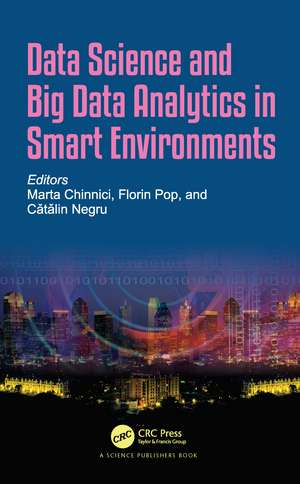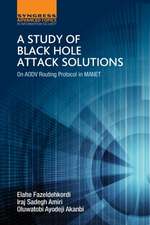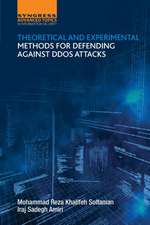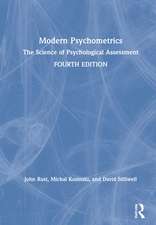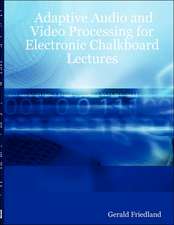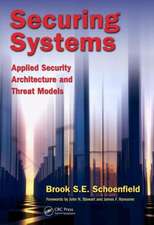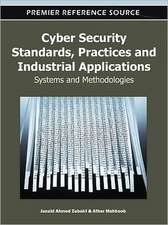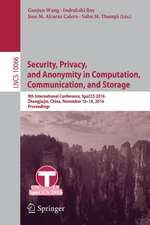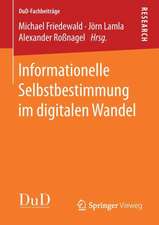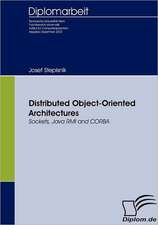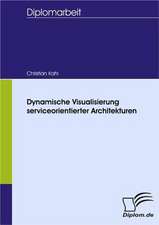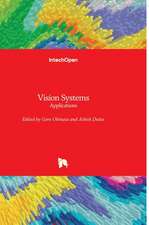Data Science and Big Data Analytics in Smart Environments
Editat de Marta Chinnici, Florin Pop, Catalin Negruen Limba Engleză Hardback – 29 iul 2021
Fundamental issues pertaining to smart environments (smart cities, ambient assisted leaving, smart houses, green houses, cyber physical systems, etc.) are reviewed. Most of the current efforts still do not adequately address the heterogeneity of different distributed systems, the interoperability between them, and the systems resilience. This book will primarily encompass practical approaches that promote research in all aspects of data processing, data analytics, data processing in different type of systems: Cluster Computing, Grid Computing, Peer-to-Peer, Cloud/Edge/Fog Computing, all involving elements of heterogeneity, having a large variety of tools and software to manage them. The main role of resource management techniques in this domain is to create the suitable frameworks for development of applications and deployment in smart environments, with respect to high performance. The book focuses on topics covering algorithms, architectures, management models, high performance computing techniques and large-scale distributed systems.
| Toate formatele și edițiile | Preț | Express |
|---|---|---|
| Paperback (1) | 438.71 lei 6-8 săpt. | |
| CRC Press – 24 iul 2023 | 438.71 lei 6-8 săpt. | |
| Hardback (1) | 979.67 lei 3-5 săpt. | +27.91 lei 7-13 zile |
| CRC Press – 29 iul 2021 | 979.67 lei 3-5 săpt. | +27.91 lei 7-13 zile |
Preț: 979.67 lei
Preț vechi: 1224.58 lei
-20% Nou
Puncte Express: 1470
Preț estimativ în valută:
187.47€ • 197.13$ • 154.90£
187.47€ • 197.13$ • 154.90£
Carte disponibilă
Livrare economică 26 martie-09 aprilie
Livrare express 12-18 martie pentru 37.90 lei
Preluare comenzi: 021 569.72.76
Specificații
ISBN-13: 9780367407131
ISBN-10: 0367407132
Pagini: 304
Ilustrații: 99
Dimensiuni: 156 x 234 x 19 mm
Greutate: 0.72 kg
Ediția:1
Editura: CRC Press
Colecția CRC Press
ISBN-10: 0367407132
Pagini: 304
Ilustrații: 99
Dimensiuni: 156 x 234 x 19 mm
Greutate: 0.72 kg
Ediția:1
Editura: CRC Press
Colecția CRC Press
Cuprins
Preface. Contributors. Mobility-Aware Solutions for Edge Data Center Deployment in Urban Environments. Effective Data Assimilation with Machine Learning. Semantic Data Model for Energy Efficient Integration of Data Centres in Energy Grids. Managing the safety in smart buildings using semantically-enriched BIM and occupancy data approach. Belief Rule-Based Adaptive Particle Swarm Optimization. NoSQL Environments and Big Data Analytics for Time Series. A Territorial Intelligence-based Approach for Smart Emergency Planning. Big Data Analysis and Applications for Energy Performant Buildings and Smart Cities. Selecting Suitable Plants for a Given Area using Data Analysis Approaches. Ontology-Based Security Requirements Framework for Current and Future Vehicles. Dynamic Resource Provisioning Using Cognitive Intelligent Networks based on Stochastic Markov Decision Process. Data model for water resource management. References.
Notă biografică
Marta Chinnici graduated in Mathematics (2004) magna cum laude at the University of Naples (Italy), where she received her PhD in Mathematics and Computer Science (2008) with a thesis on stochastic self-similar processes and applications in non-linear dynamical systems. Currently, she is a Senior Researcher at the ENEA’s Department of Energy Technologies and Renewable Energy Sources, ICT Division, where she works on ICT for Energy Efficiency issues. She is a European Commission Expert in the field of ICT and a review/evaluator for several European programs on the same topic. She is Member of Technical Programme Committees of various international conferences and workshops, and Editor/Referee of relevant journals in the fields of computer science, data science and energy. To date, she authored more than 50 scientific articles and books, and presented in leading national and international conferences on ICT and energy topics.
Florin POP is professor at the Department of Computer and Information Technology, the Politehnica University of Bucharest. He also works as a 1st degree scientific researcher at National Institute for Research and Development in Informatics (ICI) Bucharest. His general research interests are: distributed systems (design and performance), grid computing and cloud computing, peer-to-peer systems, Big Data management, data aggregation, information retrieval and classification techniques, Bio-inspired optimization methods.
Cǎtǎlin NEGRU is a system engineer and researcher at the Department of Computer and Information Technology at University Politehnica of Bucharest (UPB). He obtained his PhD from UPB in 2016. His research interests include distributed systems, energy efficiency, cloud storage, cyber- physical systems, GIS. His research has led to the publishing of numerous papers and articles at prestigios journals and conferences. He is involved in several national and international research projects.
Florin POP is professor at the Department of Computer and Information Technology, the Politehnica University of Bucharest. He also works as a 1st degree scientific researcher at National Institute for Research and Development in Informatics (ICI) Bucharest. His general research interests are: distributed systems (design and performance), grid computing and cloud computing, peer-to-peer systems, Big Data management, data aggregation, information retrieval and classification techniques, Bio-inspired optimization methods.
Cǎtǎlin NEGRU is a system engineer and researcher at the Department of Computer and Information Technology at University Politehnica of Bucharest (UPB). He obtained his PhD from UPB in 2016. His research interests include distributed systems, energy efficiency, cloud storage, cyber- physical systems, GIS. His research has led to the publishing of numerous papers and articles at prestigios journals and conferences. He is involved in several national and international research projects.
Descriere
Many applications generate large datasets, like social networking and social influence programs, smart cities applications, smart house environments, Cloud applications, public web sites, scientific experiments and simulations, data warehouse, monitoring platforms, and e-government services.
